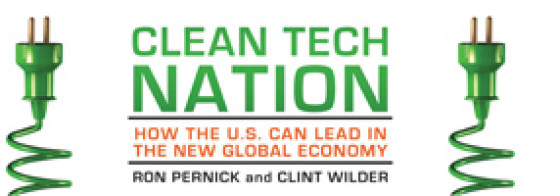
Ron Pernick, Co-Author of Clean Tech Nation
When I explain the purpose of this site to my friends, they ask a common question.
What is Clean-tech?
It’s frustrating because definitions of Clean-tech are sometimes long and too wordy to be effective.
In fact, there are many different definitions of what Clean-tech actually means. The best I have found is one written by Ron Pernick and Clint Wilder in their book Clean Tech Nation.
“Clean tech – any product, service or process that harnesses renewable materials and energy sources, reduces the use of non-renewable natural resources, and cuts or eliminates emissions and wastes.” - Ron Pernick and Clint Wilder¹
I read the book recently before I landed in America for the very first time. So, it gave me a great idea of what was going on in the Clean-tech industry across the U.S, talk about perfect timing! The book was released in September 2012 so it is one of the most recent books written on the clean tech sector and on the progress in the U.S.
In this review I am going to provide a brief overview of the book, share some take aways and powerful quotes and then finish up with my own personal thoughts.
Clean Tech Nation: How The U.S. Can Lead In The New Global Economy
by Ron Pernick and Clint Wilder, September 2012.
“Clean Tech Nation dares to imagine a country in which bipartisanship reigns, green energy is our greatest national resource and our competitive edge in the global economy is restored.” – President Bill Clinton¹
Overview
The book is organised into 6 Chapters that look at the global clean tech landscape and how the U.S. fits into the picture. The book also ranks the top states in the Clean Tech industry and talks about policy in the US giving a Seven-Point Action Plan for Re-Powering America at the end.
- Introduction: The Birth of Clean Tech
- 1. The Global Landscape
- 2. Vying for Leadership
- 3. Centers for Innovation
- 4. The Biggest Clean-Tech Developments Reshaping the World
- 5. The Clean-Tech Imperative
- 6. A Seven-Point Action Plan for Re-Powering America
Take Away’s, Concepts and Quotes
From the first chapter there were a few great quotes on the global scheme of clean tech.
“The environmental issues facing China far outpace anything seen in the rest of the world, and aren’t related to climate-change forecasts as much as to day-to-day reality.” ¹
In chapter 2, Ron Pernick and Clint Wilder share what they believe to be the 3 pillars for business activity and job creation in clean tech in the U.S. They divide the business opportunities into these 3 components.
- Manufacturing
- Technology Deployment
- IP Development
The book notes that the U.S. has much potential for offshore wind power and should follow the U.K. by example and focus on offshore wind power.
The book also mentions that clean-tech jobs are growing rapidly in the U.S. “from 2003 to 2010, U.S. clean-tech jobs grew at the rate twice that of the rest of the economy: 8.3% vs 4.2% annually.”¹
They say that the bottom line is that: “just about everyone’s in favour of job creation and a growing economy. The more those things in the minds of the american public and the business community, the more hope there is for a political mind-set.”¹
They talk about the relevance of venture capital, money provided to startup firms, and why this is so relevant to the clean tech sector. The need for commercialising new technologies involves upfront investment to fund R&D to get clean-tech startups of the ground. “In 2010, California-based clean energy startups took in nearly $3 billion of venture capital investment”¹, noting that this was 63% of all U.S. clean-energy venture capital investment for the year.
The book lists a number of clean tech companies to watch in each of the top 10 clean tech states in the U.S. (I found this as a useful way to learn about the geography before landing in the U.S. as well!).
Ron Pernick and Clint Wilder believe that clean tech industry rests on the three pillars of technology, policy and capital and that the four biggest clean tech developments reshaping the world are:
- Smart Grids and Utilities of the Future
- Fast-lane to Vehicle Electrification
- Green Building: Deep Retrofits and Net-Zero Ambitions
- The Vast Potential of Waste to Resource Technologies.
I particularly enjoyed when the book listed a number of executives that have turned around their careers from non-renewable industries to become involved in clean-tech businesses. I thought this was inspiring and motivating.
“What I want to do is leave a legacy for my kids where energy is secure. I don’t want to leave them a world where we’re fighting for the last slice of the pie, but one where we’re baking new pies.” - Cynthia “C.J.” Warner¹
The book talks about the learning multiple fields and the importance of combining them with energy issues to increase innovation and creativity. Something we mention here at Eco Founder when we discuss innovation.
“Wonder in the bewilderedness. Go wild. Mix thermodynamics with Chinese art history and cultural anthropology with naval architecture and you’ll learn how to learn.” – Amory Lovins, Rocky Mountain Institute.¹
A nice review of the last 10 Years in Clean Tech, the book looks at a number of factors and changes in these factors from 2000-2010.
Near the end of the book Ron Pernick and Clint Wilder look to debunk a few common misconceptions of clean tech in the U.S. and global markets, with the 5 Laws of Clean Tech.¹
- Clean Tech Can Scale
- The Developed World Does Not Need New Nuclear OR Coal
- “Small Tech” Will Play A Central Role
- It’s a Dispersed Revolution: local is key, no one size fits all.
- Energy Transitions Take Decades
Finally to wrap up the content of the book Ron Pernick and Clint Wilder leave us with a Seven-Point Action Plan for clean tech policy in the U.S.¹
- Enact a Nation Renewable Electricity Standard of 30% by 2030.
- Create and Fund a National Smart Infrastructure Bank
- Leverage Proven Investment Tools from the Oil, Gas, and Real Estate Sectors
- Phase Out All Energy Subsidies with Ten Years
- Foster Open-Source Collaboration to Set Clean-Tech Standards
- Fully Fund Military Initiatives on Energy and Water Security
- Launch Federally Backed Prizes for Clean-Tech Innovation
My Thoughts
I really enjoyed the book. I personally liked the positive tone throughout the book. I thought the book provided an accurate picture of clean tech and focused on solutions and actions. This was refreshing as many other books from this category choose to highlight more of the negative factors, when I believe we should focusing our efforts on solutions and accept the environmental situations as what they are, facts. There is no need to dwell unnecessarily on these factors and I believe Ron Pernick and Clint Wilder have done an excellent job at providing solutions without attacking any particular corporate or political players.
I would recommend the book for…
- People who are new to clean tech: the authors have made it clear so that you are able to understand it if you are new to clean tech
- Those who are interested in policy and the U.S: if you live in the states you will gain a lot from their policy review and recommendations.
- Clean tech fanatics: If you enjoy reading about clean tech at all then I would probably recommend this book.
I throughly enjoyed it and would love to know if you have read it what your thoughts were? You can even let me know you have decided to read it because of my recommendation. Post in the comments below!
You can find out more about the book and the authors here.
Become an ECO founder
Start the 30 day ECO founder Challenge (it’s free!) to learn how to startup your own clean technology business.
No spam, ever. You can unsubscribe at anytime.
Source: ¹Pernick, R., & Wilder, C. (2012). Clean tech nation: how the U.S. can lead in the new global economy. New York: HarperBusiness.


